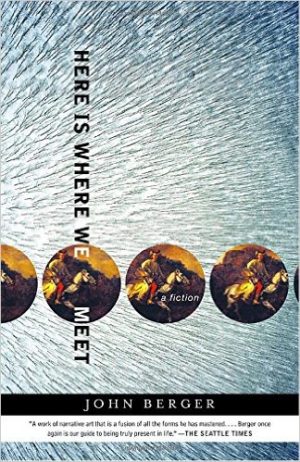 John Berger, the acclaimed author of Ways of Seeing died yesterday in Paris. He was 90 years old.
John Berger, the acclaimed author of Ways of Seeing died yesterday in Paris. He was 90 years old.
Teju Cole was among the chorus of writers and fans who took to social media to pay tribute to the literary icon.
“I miss him already,” writes Cole on Facebook, “he helped me, in ways that it will take me weeks and months to enumerate. His fierce and benevolent trace is everywhere in my work. He helped so many of us. He helped us help others. He is where we met.”
A few months ago, Teju Cole did an interview with Men’s Journal in which he revealed that Berger’s book Here is Where We Meet published in 2005 had considerable influence on his own writing. “It was pretty life-changing for me,” he says.
Even though Cole was already familiar with Berger’s work—he had been reading Berger since the ’90s—that particular book of short stories left an impression. He said that he was struck by the way Berger handled, among many other things, the sometimes delicate line between fiction and biography.
Later on in the interview, Cole said that he also liked the way Berger could write about a wide range of things. He could write about literature, politics, and art with equal is ease and beauty. Cole said that over the years he’d found it helpful to think of Berger as a “specialist in all styles”—a tag line, which Cole says he came across in West African barbershops sign board.
You don’t have to search too hard to find Berger’s influence in Cole’s work. His essay collection Known and Strange Things is richly rewarding exploration of diverse ideas and questions about politics, travel, race, literary history, music and on. Like Berger, Cole takes up all kinds of issues and writes across various fields of knowledge with ease and considerable artistry.
We join Cole in bidding farewell to Berger.
Here are few passages from the interview we thought you’d like.
***
Is there one book that’s affected you tremendously or changed your life?
Let me suggest a book called Here Is Where We Meet. It’s by a writer called John Berger. It was pretty life-changing for me. It’s a collection of short stories; it has eight and a half short stories. They’re all based on life, but they’re all fiction. It’s the way that he handles that fictionality that really affected my writing.
John Berger is quite an old man; he’s in his eighties. What he does in these stories is, he’ll write a story about someone he once knew who is now dead. He tells true stories about how he knows them or what they mean to him, but the stories are about encounters he has with them after they’ve died. Things like meeting his long-dead mother in Lisbon and going for a walk with her. It feels very diaristic and very real. The porousness of that border between what we can prove, what’s easily accessible, and what takes more face and openness — it was really interesting to me, how he handled that. He doesn’t take it from a religious point of view at all.
When did you first encounter the book?
The book was first published in 2005, but I’ve been reading Berger since the late ’90s. I really like his work. He’s a wonderful art critic; he writes about politics, and he also writes fiction. I was already very much a fan of his work, so when this book came out, I was going to get it anyway. So I probably got it around 2006 or thereabouts, or maybe right after it came out in 2005.
Like you, Berger writes about art and literature and politics. Your new collection explores all three of these topics. Is Berger someone whose work you’ve looked to as far as the overlap of the three?
I think what we get from the artists, writers, musicians, photographers, and so on who we admire is a sense of encouragement or permission to go ahead and do whatever it is that was maybe latent in us already. For me, range was always one of those things. That’s just how you live. Life is made up of many different things, and to artificially suppress some aspect of it and say, “I’m just the guy who does jokes — I don’t do politics,” or, “I’m just the guy who writes beautiful, melancholy narratives, but I don’t do scholarly analysis.”
I don’t see the sense of dividing those things, and I always admired John Berger’s willingness to get his hands dirty, and yet to not seem as though he was getting his hands dirty. Of course, it’s all propelled by his prose, and his ability to write extremely beautiful and moving English, even when he’s talking about really tough things. His work is visceral, it’s engaged, it’s political, it’s very fierce. But while you’re reading it, the impression you have is someone whose words are very, very well-chosen. To work with a very wide range of material was always something natural to me, and [it’s] very encouraging to see other writers who were able to do it successfully.
There’s a sign outside West African barber shops that says, “Specialists in All Styles.” Rather than the dismissive “jack of all trades,” as we have in the English language, I like this idea of “specialist in all styles.”
Read the full interview HERE.









COMMENTS -
Reader Interactions